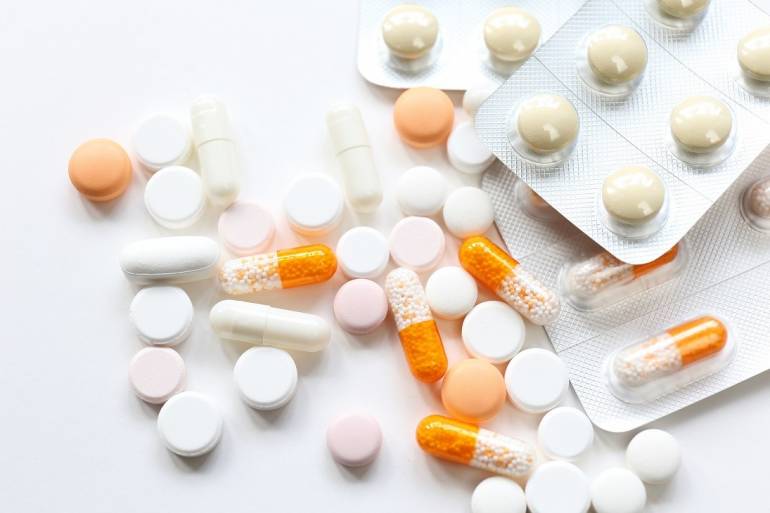On the market you will find many groups of pharmaceutical preparations: prescription drugs, OTC drugs, dietary supplements, medical devices, dermocosmetics and many others. They differ not only in their registration status, but also in their purpose, potential action and properties of their ingredients. What conditions must a preparation meet to qualify as an OTC drug? We explain.
OTC drugs – what are they?
OTC drugs (from “over the counter,” which means “in free circulation”) is a specialized name for pharmaceutical preparations commonly referred to as “over-the-counter drugs.”
In order for a preparation to receive the status of a drug, it must undergo detailed legally required procedures and studies. In the course of these studies, their effectiveness in treating specific diseases and the safety of their use must be proven. Over-the-counter drugs are most often preparations containing active substances with a specific proven therapeutic effect, but in a smaller dose and with a weaker effect than prescription drugs. Like prescription drugs, OTC drugs can also cause side effects. For a medicinal product to be approved as an OTC drug, it must be safe for a strictly limited period of use (usually up to 3 or 5 days) for specific ailments that are easily self-diagnosed by the patient. The criteria for the availability of OTC medicinal products are defined by the WHO and, in Europe, by the EMA.
Over-the-counter (OTC) medications are allowed to be used without medical consultation, although they are sometimes recommended by specialists at the first symptoms of illness or supportively during the recovery period. It is usually recommended to take OTC medications only for a period of 5 days. If there is no improvement during this time, then you should seek medical advice.
The second group consists of OTC medications, which are used supportively during recovery from serious illnesses. Sylimarol®Vita 150 is an OTC drug, which is recommended for use in states of recovery from toxic-metabolic liver damage and in indigestion (flatulence, belching) after eating hard-to-digest foods. To achieve the intended therapeutic effect, the preparation should be used systematically for about 2-4 weeks. If the ailment intensifies or does not subside, contact your doctor, who may extend the treatment to, for example, 6 months.
Non-prescription drugs – who can use them and how?
Each pharmaceutical preparation has a specific daily dose or serving for use. Before taking any preparation, it is a good idea to read the package insert and information on the package first. This is especially important in the case of medicines, where the leaflet describes, among other things, the indications and contraindications, the length of time and manner of taking, and the groups for which the drug can be used (and the dosage appropriate for them).
Pay attention to the age range from which the product can be used. Many drugs, including over-the-counter ones, can be taken by adults and children over 12. year of age. In such a situation, let’s look for over-the-counter medications designed typically for children – with a smaller dose and in a form easier for them to take (such as tasty syrup). However, even in this case let’s carefully read the leaflet before administration, as many preparations can be used in children from 3. year of age.
Drugs vs. dietary supplements – are they the same, how are they different?
Although both groups of preparations are available in pharmacies and drugstores, they have completely different purposes and properties. The similarity of form (e.g. capsules, tablets) causes many people to associate supplements as replacements for drugs. And this is a completely misconception.
A dietary supplement is a product classified as a food product, which has nutrients in its composition (such as vitamins, minerals, plant materials, etc.). The purpose of using the product is to supplement nutritional deficiencies, so as the name suggests – supplementation of the daily diet.
It is worth remembering that supplementation of vitamin or mineral deficiencies is aimed at returning the body to health balance. The use of supplementation can therefore reduce the risk of developing certain diseases. If the results of laboratory tests indicate a deficiency of specific substances in the body, then the doctor may recommend the use of specific dietary supplements to compensate for these deficiencies.
It is also recommended to reach for supplements when there is an increased need for certain nutrients, such as during pregnancy, intense exercise or during convalescence. However, it is worth asking your doctor each time about the legitimacy of use and recommended daily portions.
Remember that the use of dietary supplements does not have a specific therapeutic effect. They are food preparations that are intended to supplement deficiencies of specific components in the diet. So, from a medical point of view, they are not drugs, they have no proven therapeutic efficacy. This group of preparations in the registration process is subject to much less testing than in the case of drugs.
Remember that drugs and dietary supplements are two groups of preparations with different purposes. Drugs are intended to produce a specific therapeutic effect in the course of a disease, and the active substances contained in them have proven therapeutic properties. Dietary supplements, on the other hand, are intended to supplement nutritional deficiencies, by design they are supposed to help get the body in good shape. Knowing this distinction, we know which preparations to reach for from pharmacy or drugstore shelves.
Over-the-counter drugs are preparations with proven specific effects on the body. Let’s keep this in mind. They will be effective and safe if we stick to the doctor’s recommendations or the leaflet recommendation. They can be dangerous to health when used improperly, for too long or in inadequate doses.







